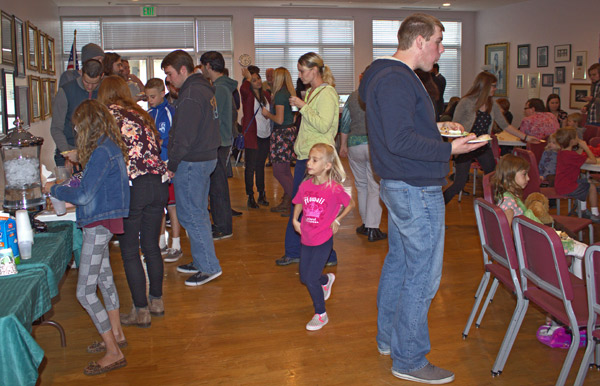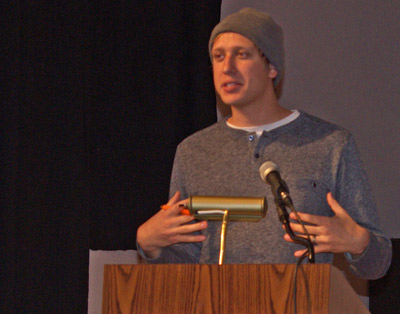‘Community of Good’ transcends religion through secular humanism
December 8th, 2015 Posted in religionStory & Photos by Morgan Pratt
LOGAN — On the surface, the Community of Good seems like your typical church. Family members save seats for latecomers, while kids kneel to use their chairs as a hard surface for their coloring books. Someone makes an announcement from the lectern about gathering clothes for homeless youth. And everyone greets each other with a cheerful grin.

Members of the Logan Community of Good mingle after services at the Dasante Theatre on Sunday. (Morgan Pratt photo)
But the Community of Good is not a church at all: it is a secular humanist group in Logan launched in September. Secular humanism is an ideology that focuses on the betterment of humankind rather than on a divine being or on a particular religious practice.
The COG is a “secular community that provides a supportive environment to residents in or near Cache Valley who may or may not choose to affiliate with organized religion,” the group’s website explains. “Dedicated to social interaction, intellectual exploration, and humanitarian service, the Community of Good allows members to enjoy the benefits of a tight-knit community without the dogma, rites, or rules of religion.”
But there are many questions surrounding what role the Community of Good is going to play, especially because it is just an experiment of transcending religious boundaries, says co-founder Kimberly Nelson.
The COG was established after a group of people came together to answer one question: “How can we help people in Cache Valley connect and work together regardless of religious affiliation?” The organization was founded in part by group administrators Nelson, Tanner Gilliland and John Dehlin, along with the help from 15 to 20 others from around Cache Valley, some of whom are on different points of the Mormon spectrum.
Nelson occasionally attends the LDS church; Gilliland left the church during the mass resignation of LDS members in Salt Lake City in November, over the church’s stand on the children of same-sex couples. Dehlin is a well-known podcaster who was excommunicated in February because his “Mormon Stories” podcast was critical of the LDS church.
However, “the community” is much more than a meeting place for those who come from a Mormon background. It is a place where anyone can find friendship and community regardless of religious orientation, Nelson said.
Some COG members still have callings within the LDS church. Plus, the founders don’t want to limit the group’s potential by putting labels on it, including a post-Mormon label, especially because the organization is still in its formative stage.
The COG meeting on Sunday took place in the Dansante Theater on 100 West. It started off with a reminder from member Connor Snyder that while many people who attend the COG are formerly LDS, the organization is not about being post- or anti-Mormon.

Conner Snyder addresses his “community.” (Morgan Pratt photo)
“The Community of Good is bigger than that,” Snyder said. The organization is about coming together as a community and transcending religion, he said, about building progress for humanity in general.
Nelson agrees. “We just don’t want to be a transition group,” she said. “But if people are disillusioned with their religion or they are just in a difficult spot, we want this to be a safe place where they can make friends.”
Other than the prominent post-Mormon roots, one other commonality was clear: The congregation was dominated by millennials, people age 19-34. This is consistent with a recent Pew Research Center study that concludes that millennials are increasingly areligious. The study shows 35 percent of people born between 1981 and 1996 consider themselves to be unaffiliated with any church, compared with 21 percent of millennials who self-identify as evangelical Protestants, 16 percent as Catholics and 16 percent as mainline Protestants.
Jared Anderson, who has a doctorate in religious studies and focuses his research on how to replace religion with humanism, predicts there will be more secular humanist groups like COG popping up, although he disagrees with labeling the group merely as a “community.” Secular humanism, he says, will be the best future religion.
“Religion can mean both more and less than you might think,” he said to the congregation. “It both resonates and disappoints. All of you are religious, whether or not you think you are.”
He argues that humans and religion have co-evolved together, because as people we love to tell ourselves stories and because humans are deeply ritualistic. There is no doubt religion is a cultural means that impacts the world, and Anderson says COG can be one of those mechanisms.
“Can you think of any aspect of culture that motivates more powerfully and more universally than religion?” Anderson asked.
While religion is an intrinsic element of the human experience, being a humanist is about transcending religion by using science as a tool to repair the broken world. Even with the huge impact of religion, it does not effectively encourage people to be the best humans they can be, he said.
“Religious humanism holds the greatest potential to transcend religion and heal the world,” Anderson said.
TP
Tags: Community of Good, ex-LDS, excommunicate, John Dehlin, Kimberly Nelson, Mormons, religion, Tanner Gilliland

Sorry, comments for this entry are closed at this time.